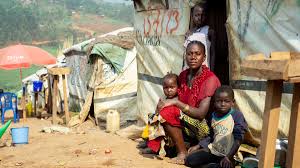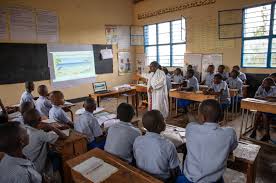The UK government has revealed its plans to reduce foreign aid by 40%, marking a significant shift in its international development priorities. This decision, which follows months of scrutiny and pressure, is set to disproportionately affect African nations, with vital sectors like children’s education, women’s health, and water sanitation facing deep cuts.
The cuts, which are part of a broader effort to increase defense spending to 2.5% of the UK’s GDP, have sparked strong criticism from aid organizations. Charities argue that the reduction in foreign aid will harm some of the world’s most vulnerable populations, leaving them at greater risk of disease, poverty, and death.
In February, the UK government announced that foreign aid spending would be slashed from 0.5% to 0.3% of the country’s gross national income. The decision came after pressure from the United States, prompting the UK to focus more on military expenditure. As a result, funds for crucial programs aimed at tackling poverty and improving public health in Africa are now severely restricted.
A report by the Foreign Office shows that the largest reductions will be in Africa, where the most significant cuts will affect women’s health services and water sanitation projects. Aid charities warn that these reductions could lead to the spread of preventable diseases and further economic instability in regions already grappling with crises.
International development groups, including Unicef and Bond, have condemned the decision, with many calling it “short-sighted” and “deeply harmful.” The World Bank’s International Development Association (IDA) will continue to receive significant funding, but experts argue that this funding will not be enough to offset the cuts that will impact local projects in countries like South Sudan, Ethiopia, and Somalia.
Monica Harding, the Liberal Democrat spokesperson for international development, has warned that this is only the beginning of even deeper cuts expected next year. “The poorest and most vulnerable people will bear the brunt of these political decisions,” she said.
One of the hardest-hit areas is education. Street Child, a UK charity working in Sierra Leone, South Sudan, and the Democratic Republic of the Congo, has said that the cuts could end its efforts to provide education to children in these countries. CEO Tom Dannatt described the situation as “sad and short-sighted” and stressed the long-term harm that the decision could cause, especially for children who will no longer have access to school.
Meanwhile, Unicef UK’s Philip Goodwin emphasized that the cuts will have a particularly devastating effect on women and children. “We urge the government to rethink its strategy and place vulnerable children at the heart of its aid programs,” he said.
The move to reduce foreign aid has triggered a heated debate in the UK, with some arguing that the government is failing in its global humanitarian responsibilities. Sarah Champion, chair of the International Development Committee, criticized the decision, stating that it would come at the expense of the world’s most vulnerable populations.
The cuts have also sparked international concern, with some viewing it as a retreat from the UK’s historical leadership in foreign aid. Under past governments, including Tony Blair’s and Gordon Brown’s Labour administrations, the UK had committed to a target of 0.7% of gross national income for foreign aid. However, the Conservative government’s decision to reduce this figure reflects changing priorities.
The UK’s decision to slash foreign aid marks a turning point in its global development strategy. While the government argues that the cuts will allow for more effective prioritization of resources, critics say the consequences will be felt most in regions already struggling with poverty, disease, and conflict.
The 2026 elections in the UK may become a referendum on this policy, as citizens and aid organizations voice their concerns over the long-term impact of these cuts. For Africa’s most vulnerable communities, these reductions could be a devastating setback, as they face increased risks to their health, education, and overall well-being.
The full impact of these cuts remains to be seen, but one thing is clear: the world’s poorest, particularly in Africa, will bear the greatest burden. As the UK shifts its focus to military spending, many are asking if it has forgotten the value of humanitarian aid in shaping a more just and stable world.



